learning Japanese (日本語) and sometimes other languages also | welcome to my little japanese corner | please read pinned post 📍
Don't wanna be here? Send us removal request.
Text
誕生日おみでと土方くん🚬🎉 マヨ―キング
誕生日 → たん[誕]じょう[生]び[日]
m. Birthday
romanji. tanjoubi
誕生 means "Birth"
Hijikata Toshirou icons.









27 notes
·
View notes
Text
apparently one of the ways to say "shaved my head" in Japanese is "頭を坊主にした" which is literally something like "did the monk thing to my head"
66K notes
·
View notes
Text
Probably some of the best advice I’ve gotten about watching stuff in a language you’re learning when you don’t know every single word and you’re stressing over it is to pretend like the video is on mute and still try to figure out what’s going on. Like focus on the meaning and not the words. Like when you’re sitting in a waiting room and there’s a kids cartoon on mute on the tv or something and you can sort of piece together what’s going on. Do that but with the volume on.
998 notes
·
View notes
Text
Kanji of the Day
前 (JLPT N5)
h:まえ (ma-e)
m: before, previously, earlier
This kanji can be used for referring to a person ("you") in a very casual way.
お前
h: おまえ(O-ma-e)
m: you
Stroke Order:

Source
#japanese#learning japanese#japanese vocabulary#japan#hiragana#kanji#learn japanese#langblr#katakana#it always fascinates me how a suffix changes the entire meaning of a kanji!#JLPT#JLPT N5
11 notes
·
View notes
Text
Kanji of the day
自分 (JLPT N5)
Kanji breakdown: じぶん
自:じ // 分: ぶん
m: oneself, myself, I
Stroke Order:


Source
#japanese#learning japanese#japanese vocabulary#japan#hiragana#kanji#learn japanese#langblr#JLPT N5#new word#language blog#japanese language learning resources#language study#language learning#language tumblr#linguistics
20 notes
·
View notes
Text
品
しな
① goods; article
② refinement; dignity
③ counter for meal courses
この品には税がかかりますか。 この しな には ぜい が かかります か。 Is there any tax on this item?

#日本語#japanese#japanese language#japanese langblr#langblr#studyblr#japanese vocabulary#shi-na#not my post
26 notes
·
View notes
Text
You know what I think is really cool about language (English in this case)? It’s the way you can express “I don’t know” without opening your mouth. All you have to do is hum a low note, a high note, then another lower note. The same goes for yes and no. Does anyone know what this is called?
410K notes
·
View notes
Text
Why does like every language do things with their R sounds that nobody else understands
38K notes
·
View notes
Text
so に can only be used on cloudy days? and を can only be used when you're wearing mismatched socks? i see, i see. and to be clear, は can only be used to compare your joy to someone else's disappointment when an act of schaudenfreude occurs. and が (the connecting clause, not the particle) is only for connecting a pair of ill-fated lovers together. and で is limited to cartographers, so don't even ask about it.
oh and one more thing, you can only use へ if the first bird you see that day takes flight sixty degrees northward in subpar wind conditions
228 notes
·
View notes
Text
Romanji for anyone struggling to read:
1. ko-u-ge-ki-te-ki
2. fu-ku-kyo-u
3. so-u-ta-i
4. te-n-ke-n
5. fu-yu-ka-i
6. ke-byo-u
7. ke-n-me-i
8. ko-u-ri-tsu
9. bi-n-ka-n
10. za-i-ko
11. sho-u-ta-i
12. do-ku-se-n
Japanese Vocabulary ヾ(^∇^/ ''
1 . 攻撃的 (こうげきてき): aggressive, offensive
2 . 副作用 (ふくさよう): adverse effect (of a medication), side effect
3 . 早退 (そうたい): leaving early
4 . 点検 (てんけん): detailed inspection, checking
5 . 不愉快 (ふゆかい): unpleasant, disagreeable
6. 仮病 (けびょう): feigned illness
7. 賢明 (けんめい): wise, sensible, intelligent
8. 効率 (こうりつ): efficiency
9. 敏感 (びんかん): sensitive, susceptible, aware, alert
10 . 在庫 (ざいこ): stock, inventory
11. 招待 (しょうたい): invitation
12. 独占 (どくせん): monopoly, exclusivity
#japanese vocabulary#japanese language#hiragana#kanji#romanji#japan#learn japanese#japanese#learning japanese#asian languages#langblr
99 notes
·
View notes
Text
Japanese History Words
将軍 (しょうぐん)
they were a pretty big deal ~

Shōgun: Officially this position was called 征夷大将軍 (Hiragana: せいいだいしょうぐん, Romanji: seii taishōgun) As we know, Japanese love their abbreviations, Shōgun (将軍, means army leader). Kanji Breakdown: 征(せい, sei) means to "conquer" or "subjugate" 夷(い, i) means "brutish" or "unsophisticated warrior" 大(だい, dai) means "big" or "great" [meaning of this kanji changes based on context] 将(しょう, sho-u) means "commander" or "leader" 軍(ぐん, gun) means "armed forces" or "troops"
Essentially, 征夷大将軍 means Commandar in Cheif of Army Against the Barbarian Forces [or Commander-in-Chief of the Expeditionary Force Against the Barbarians]
They were the millitary rulers appointed by the Emperor of Japan in the periods spanning between 1185 - 1868. Generally, Shogun were the de-facto rulers of the country. The last Shogunate of Japan was the 徳川幕��� (Tokugawa Shogunate) also known as the Edo Shogunate. There were total of three shogunates established in Japan: 1. 鎌倉幕府, Kamakura Shogunate (1192–1333, overthorwn during the Kemu Restoration, re-establishing the Imperial Goverment rule until being overthrown by the Ashikaga Takauji and his offspring forming the 足利幕府) 2. 足利幕府, Ashikaga Shogunate (1336–1573, overthrown by 織田信長, Oda Nobunaga, a damiyo) 3. 徳川幕府, Tokugawa Shogunate (1603–1868, disbanded in 1867)
Now of course, the history of each other these shogunates and famous shoguns require many, many posts to over!
As always, Gintama has inspired me to learn more about Japanense culture hehe. Hopefully this was helpful to you as well :)
Please feel free to add onto the post with histroy facts and other interesting stuff :D
#japanese#learning japanese#japanese vocabulary#japan#hiragana#kanji#learn japanese#katakana#langblr#gintama#shogun#history#japanese history#military#edo period#shogunate#rulers#sakata gintoki#oda nobunaga#tokugawa ieyasu#kamakura#world history#learning a new language#learning
15 notes
·
View notes
Text
youtube
best series of ads ever
#japanese#ads#you can make fanart of this#long long man#learn japanese#japan#japanese culture#funny#funny videos#humor#valentines day#Youtube
55 notes
·
View notes
Text
Learning a new kanji today (from JLPT N3)
美
ひらがな: うつく
meaning: beauty

I think this is a beautiful (heh, get it?) Kanji that means beauty. Generally it is used as - 美しい - which means beautiful both as artiscially and in apperance. きれい (Ki-re-i) also means beautiful in apperance but it could also mean clean and/or neat depending on context. Therefore, 美しい is generally used to describe a deep admiration of something that is asetheically pleasing.
One of my favroutie use of this words (and where I picked it up from), is from Gintama:
美しく最後を飾り付ける暇があるなら、最後まで美しく生きようじゃねか。
( うつくしくさいごをかざりつけるひまがあるならさいごまでうつくしくいきようじゃねか。)
romanji: Ustsukushiku saigo o kazaritsukeru hima ga arunara, saigomade ustukushiku ikiyouja ne ka
meaning: If you have time to fantasize about a beautiful end, then just live beautifully 'til the end.

kanji source: here
#japanese#learning japanese#japanese vocabulary#japan#hiragana#kanji#learn japanese#langblr#gintama#gintoki sakata#katsura kotarou#beautiful#jlpt n3#japanese vocab#vocabulary
25 notes
·
View notes
Text
Japanese Linguistic Observations in Spy x Family - part 6
Part 6 – Supporting character musings – Eden kids
In the first three parts of this post series, I talked in detail about how each of the Forgers' specific ways of speaking in the Japanese version helps shape their character. Now I want to analyze the supporting SxF characters in terms of their speech and see what traits we can infer. I'll discuss the Eden kids first, and then the supporting adult characters like Yuri, Fiona, etc, in the next post.
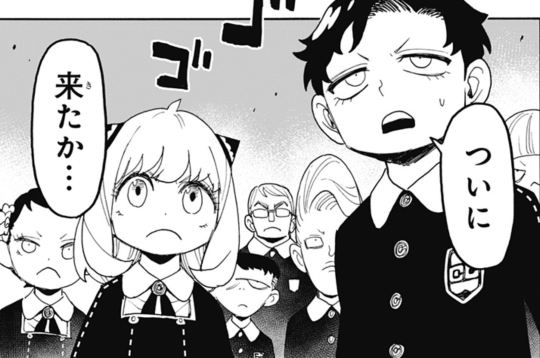
I'm going to start with Damian since I feel he has the most complexity in terms of what can be analyzed from his speech. While there's nothing about his speech that really stands out to me, at least compared to the Forgers, there's still little telling nuances based on his choice of words and honorifics. He uses casual speech for fellow kids his age, and polite speech for (most) adults, which is normal…I say "most" adults though because, while he uses keigo (the standard polite form of Japanese speech) for Eden teachers and the adults in his family, he doesn't use it at all during his first encounter with Loid. He even calls Loid おっさん("ossan"), which is basically "mister" but for middle-aged or older men, instead of 兄さん("niisan"), which is the same, but for a younger man akin to Loid's age.
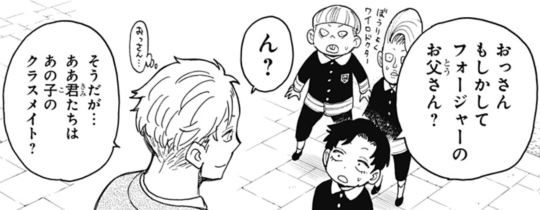
Later, as Loid's goody-goody act gets on his nerves, his speech becomes a bit vulgar. He adamantly shouts that he "won't hang out with that peasant girl," using the "crude" conjugation of "won't be friends with/hang out with", 相手にしねー! ("aitei ni shine!") instead of the casual 相手にしない ("aitei ni shinai"). He even says うるせー ("urusee") which means "shut up" and is even more rude than うるさい ("urusai"). I'm actually surprised he let himself talk like that in front of Donovan. I suppose it shows how passionate he is about his "aversion" to Anya.

Speaking of Anya, he's never addressed her by name in the Japanese version, opting instead to call her, at best, the casual form of "you," "omae" ("お前") and at worst, some rude name like "temee" ("手前"), the derogatory form of "you."
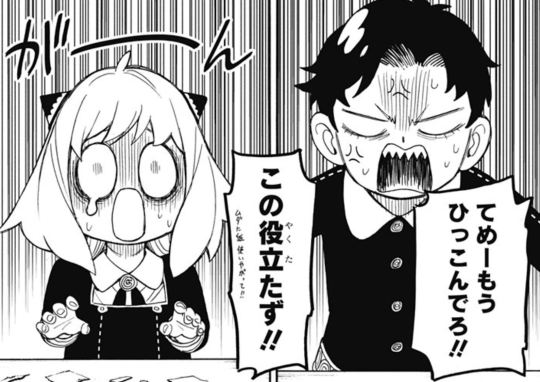
When it comes to his family, he addresses Donovan and Melinda as 父上 ("chichi-ue") and 母上("haha-ue") respectively. These are more formal terms for the standard polite ones typically used to address your father and mother, "o-tou-san" (お父さん) and "o-kaa-san" (お母さん). For Demetris though, he's more casual. Not only does he use plain speech, but he also calls Demetris 兄貴 ("aniki"), which is a term of endearment, like "Big Bro."
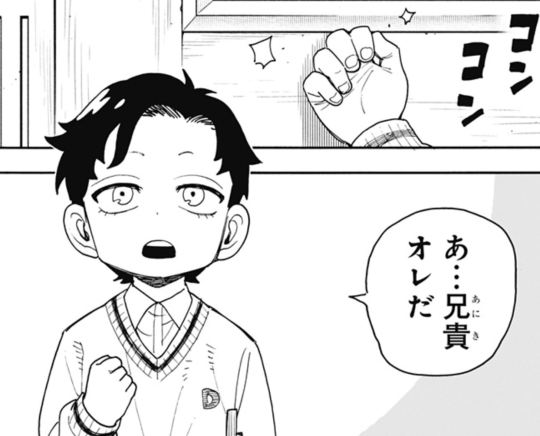
He uses casual speech with Jeeves as well, which makes sense since Jeeves is a butler and thus "lower" than anyone in the Desmond household.
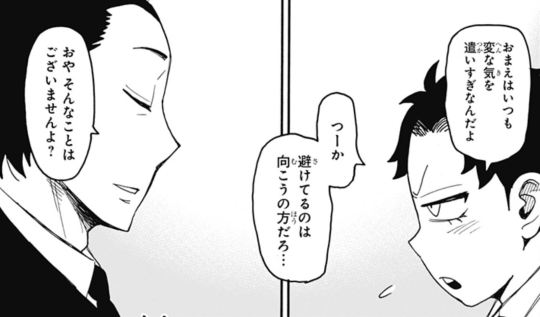
To me, all of this implies that Damian is a fairly normal kid in terms of how he addresses those around him, with the exception being his extreme formality with his parents. Terms like "chichi-ue" and "haha-ue" are mostly used in uptight, flatulent families, and obviously families like the Desmonds match that description. But it also shows how this is forcing Damian to rarely get the affection and bonding he craves from his parents.
As a side note, I don't have much to say about Bill and George, since they're such minor characters and nothing about their speech stood out to me in the few chapters they appeared in. But I found it interesting that they both call Damian "Damian-kun," with "-kun" in this case being an honorific to show endearment for a male equal, similar to "-chan" for females. However, Damian doesn't use "-kun" with any of the other male students, which is another indication of his comparatively standoffish personality.
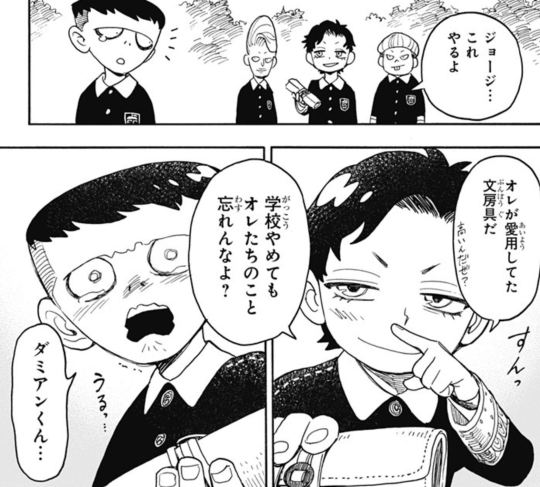
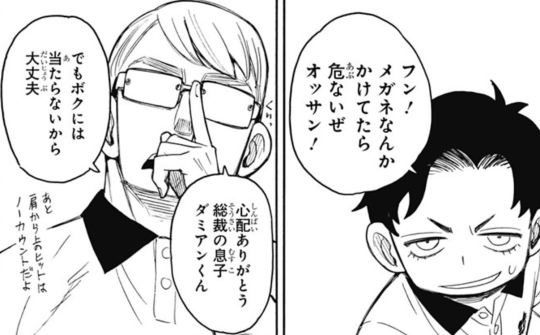
Ewen and Emile speak similarly to Damian, using casual speech for fellow kids and keigo for adults. The exception with them, however, is that they address Damian with keigo as well. Not only that, but they call him "Damian-sama," which is unusual among friends their age. The honorific "-sama" is more humbling than "-san" and is often translated as "Lord" or "Master." I wonder what Damian has done to make them think so highly of him.
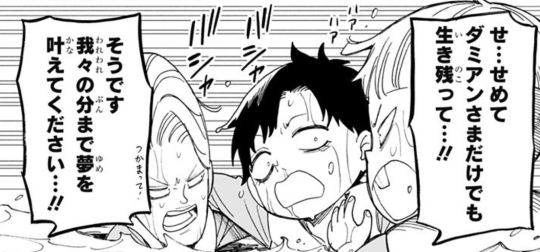
Moving onto Becky, she uses feminine speech in most situations. This speech is defined by adding softening interjections at the end of sentences, like "ne" (ね), "no" (の), and especially "wa" (わ). She also uses a variety of honorifics for the other characters. She calls Anya "Anya-chan," with "-chan" being a term that shows affection between female friends. She uses the feminine "I/me" pronoun "atashi" as well.
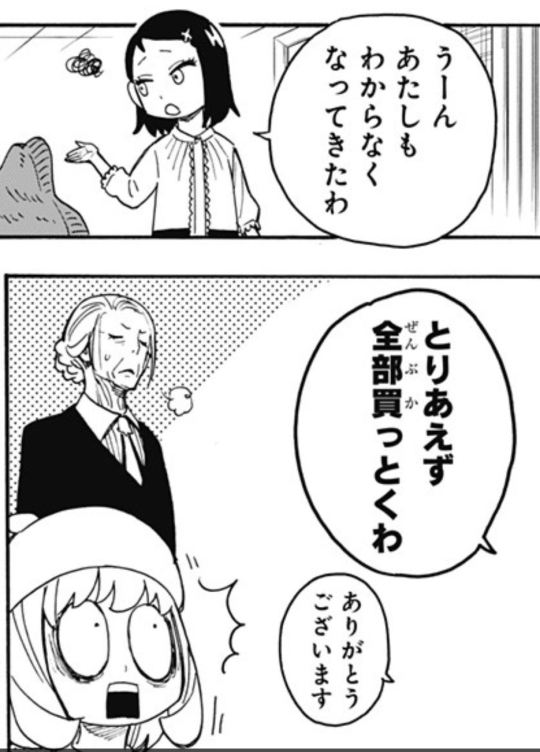
Because of her infatuation with Loid, she calls him "Loid-sama," with "-sama," as I just discussed, being a very polite honorific used for someone you're subservient to, or at least someone you look up to immensely.
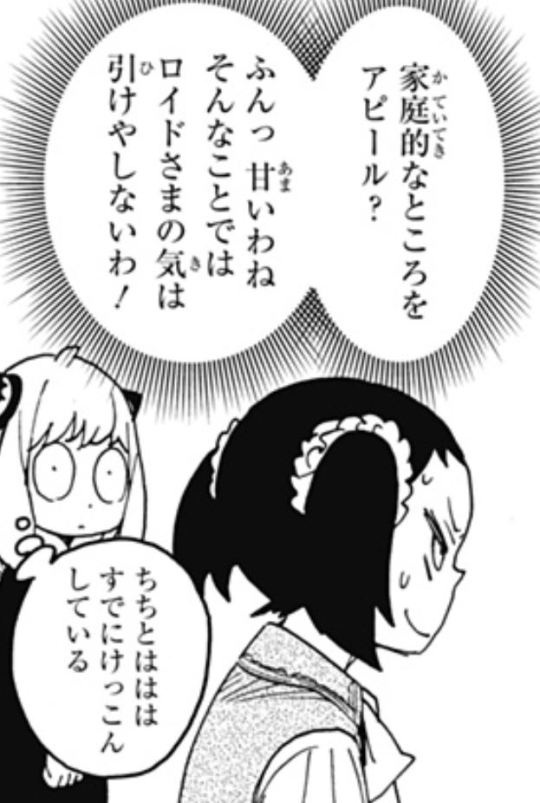
She's actually never called Yor by her name – at first she calls Yor 奥さま ("oku-sama"), which is a polite way of addressing someone else's wife, typically translated as something like "honorable wife." But after she sees how strong Yor is and "officially" decides to be her mentee (in her mind anyway), she calls Yor 師匠 ("shishou") which means "master" or "teacher" in a trainee to trainer sense.

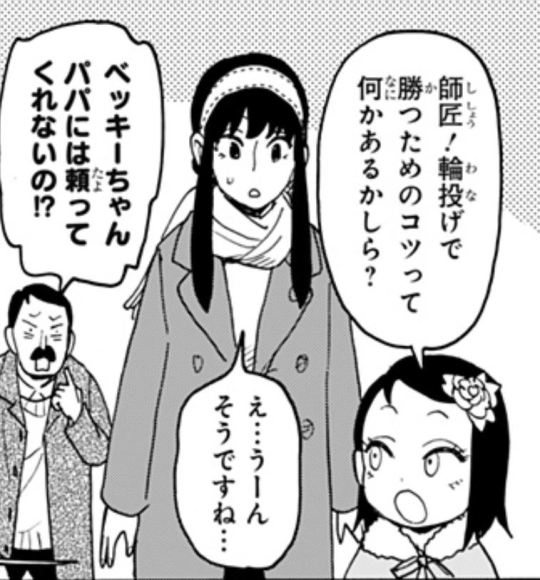
But despite her high social status as a Blackbell, Becky uses the most childish terms for her mother and father, "papa" (パパ) and "mama" (ママ) respectively.
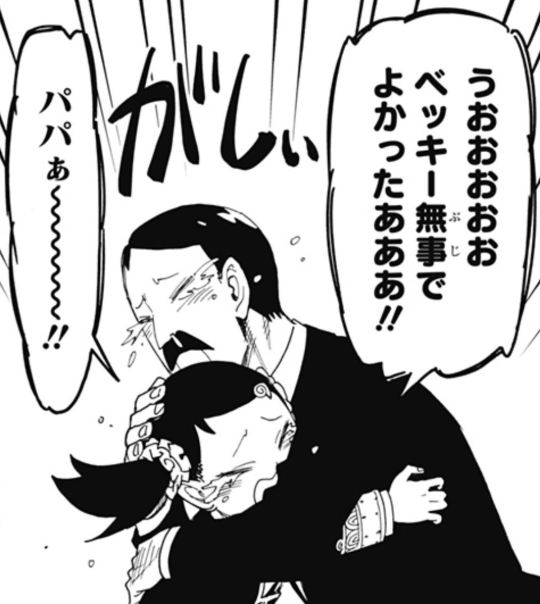
It's not uncommon for very young kids to address their parents in such a way, but it is ironic that everything else about Becky makes her seem like she wants to be more "grown-up" than she actually is, but she's still just a kid deep down, at least when it comes to her relationship with her parents.
<- Return to Part 5
384 notes
·
View notes
Text
Please don't forget my baby



If i had a nickel for every animie that featured an unassuming badass named sakamoto id have two nickels which isnt alot but its weired that it happened twice
17 notes
·
View notes
Text

303 notes
·
View notes
